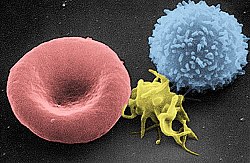Pure red cell aplasia

Editor-In-Chief: Prab R Tumpati, MD
Obesity, Sleep & Internal medicine
Founder, WikiMD Wellnesspedia &
W8MD's medical weight loss NYC, sleep center NYC
Philadelphia medical weight loss and Philadelphia sleep clinics
| Pure red cell aplasia | |
|---|---|

| |
| Synonyms | N/A |
| Pronounce | N/A |
| Specialty | N/A |
| Symptoms | Anemia, fatigue, pallor, shortness of breath |
| Complications | Heart failure, angina, infections |
| Onset | Any age |
| Duration | Chronic or acute |
| Types | N/A |
| Causes | Autoimmune disease, thymoma, viral infections (e.g., parvovirus B19), medications |
| Risks | Thymoma, autoimmune disorders, immunosuppression |
| Diagnosis | Blood test, bone marrow biopsy |
| Differential diagnosis | Aplastic anemia, myelodysplastic syndrome, hemolytic anemia |
| Prevention | N/A |
| Treatment | Immunosuppressive therapy, blood transfusion, thymectomy |
| Medication | N/A |
| Prognosis | Variable, depending on cause and treatment |
| Frequency | Rare |
| Deaths | N/A |
Pure Red Cell Aplasia (PRCA) is a rare disorder characterized by a severe reduction in the production of red blood cells (RBCs) by the bone marrow. This condition results in anemia, which can lead to symptoms such as fatigue, pallor, and shortness of breath.
Pathophysiology[edit]
PRCA is primarily a disorder of the bone marrow, where the production of red blood cells is selectively inhibited. The bone marrow normally produces erythrocytes from hematopoietic stem cells through a process called erythropoiesis. In PRCA, this process is disrupted, leading to a marked decrease in the number of reticulocytes and mature red blood cells in the peripheral blood.
Causes[edit]
PRCA can be classified into congenital and acquired forms:
- Congenital PRCA: The most well-known form is Diamond-Blackfan anemia, a rare genetic disorder that presents in infancy or early childhood.
- Acquired PRCA: This form can be caused by various factors, including:
* Autoimmune disorders such as systemic lupus erythematosus. * Viral infections, particularly parvovirus B19. * Thymoma, a tumor of the thymus gland. * Certain medications and chemotherapy agents.
Diagnosis[edit]
The diagnosis of PRCA involves a combination of clinical evaluation, laboratory tests, and bone marrow examination. Key diagnostic features include:
- Severe anemia with low reticulocyte count.
- Normal white blood cell and platelet counts.
- Bone marrow biopsy showing a marked reduction or absence of erythroid precursors.
Treatment[edit]
The treatment of PRCA depends on the underlying cause:
- For autoimmune PRCA, immunosuppressive therapy with drugs such as corticosteroids or cyclosporine may be effective.
- In cases associated with thymoma, surgical removal of the tumor can lead to improvement.
- For PRCA caused by parvovirus B19, intravenous immunoglobulin (IVIG) therapy may be used.
Prognosis[edit]
The prognosis of PRCA varies depending on the cause and response to treatment. Some patients may achieve complete remission, while others may require long-term management.
See also[edit]
Ad. Transform your life with W8MD's Budget GLP-1 injections from $75


W8MD offers a medical weight loss program to lose weight in Philadelphia. Our physician-supervised medical weight loss provides:
- Weight loss injections in NYC (generic and brand names):
- Zepbound / Mounjaro, Wegovy / Ozempic, Saxenda
- Most insurances accepted or discounted self-pay rates. We will obtain insurance prior authorizations if needed.
- Generic GLP1 weight loss injections from $75 for the starting dose.
- Also offer prescription weight loss medications including Phentermine, Qsymia, Diethylpropion, Contrave etc.
NYC weight loss doctor appointmentsNYC weight loss doctor appointments
Start your NYC weight loss journey today at our NYC medical weight loss and Philadelphia medical weight loss clinics.
- Call 718-946-5500 to lose weight in NYC or for medical weight loss in Philadelphia 215-676-2334.
- Tags:NYC medical weight loss, Philadelphia lose weight Zepbound NYC, Budget GLP1 weight loss injections, Wegovy Philadelphia, Wegovy NYC, Philadelphia medical weight loss, Brookly weight loss and Wegovy NYC
|
WikiMD's Wellness Encyclopedia |
| Let Food Be Thy Medicine Medicine Thy Food - Hippocrates |
Medical Disclaimer: WikiMD is not a substitute for professional medical advice. The information on WikiMD is provided as an information resource only, may be incorrect, outdated or misleading, and is not to be used or relied on for any diagnostic or treatment purposes. Please consult your health care provider before making any healthcare decisions or for guidance about a specific medical condition. WikiMD expressly disclaims responsibility, and shall have no liability, for any damages, loss, injury, or liability whatsoever suffered as a result of your reliance on the information contained in this site. By visiting this site you agree to the foregoing terms and conditions, which may from time to time be changed or supplemented by WikiMD. If you do not agree to the foregoing terms and conditions, you should not enter or use this site. See full disclaimer.
Credits:Most images are courtesy of Wikimedia commons, and templates, categories Wikipedia, licensed under CC BY SA or similar.
Translate this page: - East Asian
中文,
日本,
한국어,
South Asian
हिन्दी,
தமிழ்,
తెలుగు,
Urdu,
ಕನ್ನಡ,
Southeast Asian
Indonesian,
Vietnamese,
Thai,
မြန်မာဘာသာ,
বাংলা
European
español,
Deutsch,
français,
Greek,
português do Brasil,
polski,
română,
русский,
Nederlands,
norsk,
svenska,
suomi,
Italian
Middle Eastern & African
عربى,
Turkish,
Persian,
Hebrew,
Afrikaans,
isiZulu,
Kiswahili,
Other
Bulgarian,
Hungarian,
Czech,
Swedish,
മലയാളം,
मराठी,
ਪੰਜਾਬੀ,
ગુજરાતી,
Portuguese,
Ukrainian